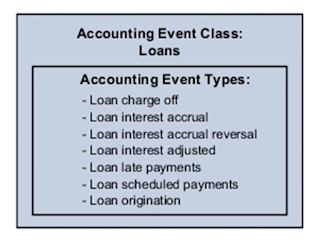Under each Source System, you need to establish your event model. An event model helps you map the transaction types from your source systems. Under each event model, we can then map accounting events which represent the transactions that may have financial significance. For example, issuing a loan and disposing of an asset is a transaction that we book in the source system.
For each one of these transactions, we need to manage and record their accounting entries by submitting the Create Accounting process for the Accounting Hub application. When you define accounting events, you must determine, from a business perspective, which activities or transactions that occur in your source system may create a financial impact. And accordingly, you will have to build an event model.
An Event Model contains three components:
Process category is just a grouping for event classes. For example, you can create a grouping for invoices and payments. Under each of these process categories are event classes and event types defined. The process category's name is taken from the source system name,
Process category is just a grouping for event classes. For example, you can create a grouping for invoices and payments. Under each of these process categories are event classes and event types defined. The process category's name is taken from the source system name,
Event Class. An event class is used to group the related transaction information and attributes within a source system. An event class is created by using the registered source system name. From the above example, "Loans" is the source system name and will be the event class and process category name, and under that, multiple event types can be defined. Accounting Hub Cloud supports only one event class per source system application. But you can have as many unique event types for segregating your transaction types under that event class.
Event Types are basically represents the transaction types of your source system. In the current example, the event types could be loan chargeoff, loan interest accrual, loan interest accrual reversal, and so on. Events with significantly different fiscal or operational implications are classified into different accounting event types. Accounting definitions in the Accounting Hub Cloud are based on an event class and event type combination. And an event type must be unique within an application.
Whenever you are planning to establish your event model, visualize the hierarchy. You will have a source system. The source system, you will have process categories. Under process categories, you will have an event class. And under an event class, you can have multiple event types. And these event types are actually reflecting your transaction types from the source system.
Follow The Oracle Prodigy on Facebook (https://www.facebook.com/theOracleProdigy/) and Twitter (https://twitter.com/D_OracleProdigy)





No comments:
Post a Comment